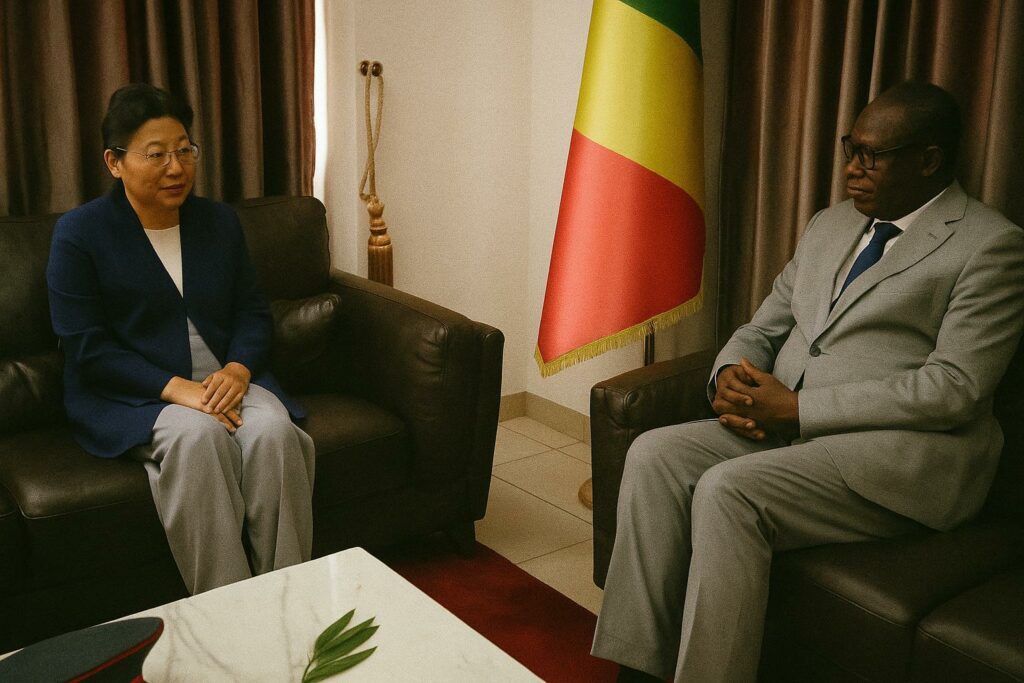A ceremonial handshake with strategic undertones
Four days after presenting her credentials to President Denis Sassou Nguesso, Ambassador An Qing crossed the granite forecourt of the Ministry of National Defence in Brazzaville. Behind the formality of military salutes lay a quiet acceleration of the Sino-Congolese defence dialogue. The minister, General Charles Richard Mondjo, invoked what he called a “mature partnership anchored in mutual respect,” while the envoy spoke of ushering in a “new Golden Sixty,” a phrase that riffs on the six productive decades since diplomatic ties were forged in 1964 (Xinhua, 8 July 2024).
The timing is emblematic. Brazzaville is navigating post-pandemic recovery, volatile hydrocarbon markets and persistent maritime insecurity in the Gulf of Guinea. Beijing, for its part, is refining its security footprint in Central Africa without courting the optics of overt military basing. In that conjuncture, high-level meetings serve both symbolism and substance: they reassure domestic constituencies in Congo of continued external support while signalling to regional capitals that China’s approach privileges capacity building over coercion.
From the Marien-Ngouabi Academy to Nanjing’s lecture halls
Concrete cooperation already frames the relationship. The rehabilitation and expansion of the Marien-Ngouabi Military Academy in Brazzaville—delivered jointly by Congolese engineers and a Chinese state-owned contractor—has doubled classroom space and introduced a digital simulation centre modelled on facilities in Guangzhou (People’s Liberation Army Daily, April 2023). Beyond infrastructure, nearly two hundred Congolese officers have completed advanced staff courses in Nanjing and Shijiazhuang over the past five years, focusing on civil-military coordination, cyber-hygiene and disaster response. Graduates occupy strategic billets within Congo’s regional commands, a fact the ministry credits with streamlining joint operations during recent flood-relief operations along the Congo River (Congo Ministry of Defence communiqué, May 2024).
Observers in Addis Ababa and Pretoria describe such programmes as emblematic of China’s preference for incremental ecosystem building rather than headline-grabbing troop deployments. For Brazzaville, the return on investment is tangible: a cadre of English- and Mandarin-speaking officers versed in logistics planning and procurement standards compatible with Chinese equipment lines. That familiarity is expected to reduce maintenance costs for the Harbin Z-9 helicopters and maritime surveillance drones already on order, according to a senior procurement official who requested anonymity.
Health security as a pillar of soft power
Defence cooperation also radiates into the public-health sphere. The refurbishment of the Pierre-Mobengo Central Military Hospital—encompassing sterile operating theatres, negative-pressure isolation rooms and an oxygen-generation plant—was completed in March and has already treated civilian trauma cases referred by provincial clinics. Medical brigades from the People’s Liberation Army’s 920th Hospital Ship ‘Peace Ark’ docked in Pointe-Noire last year, providing close to eight thousand consultations ranging from ophthalmology to paediatric cardiology (Congo Health Ministry report, 2023).
Such initiatives dovetail with Brazzaville’s ambition to become a regional hub for health resilience, an objective championed by President Sassou Nguesso during the recent African Union summit. Analysts from the Institute for Security Studies contend that the soft-power dividend of hospital ships often exceeds that of hardware transfers: goodwill generated in port visits can inoculate bilateral ties against the periodic headwinds of commodity price cycles.
Regional stability and the Gulf of Guinea equation
Maritime insecurity remains the most immediate strategic concern. Insurance premiums for vessels transiting the Gulf of Guinea climbed sharply after a spate of kidnappings off Nigeria’s Bonny Island in late 2023. Congo has sought multilateral remedies through the Yaoundé Architecture for Maritime Security yet continues to face capability gaps in domain awareness. According to the Centre for International Maritime Affairs, Chinese-supplied coastal radar stations scheduled for installation near Pointe-Indienne could extend Congo’s surveillance horizon by two hundred nautical miles, a force multiplier when paired with the navy’s modest fleet of patrol craft.
Critics in some Western think-tanks warn of potential overreliance on a single supplier of dual-use technology, but officials in Brazzaville argue that diversified partnerships remain on the table. France continues to host Congolese naval trainees in Brest, and the United States recently offered modular riverine craft under its Africa Maritime Security Initiative. Mondjo’s doctrine, reiterated during the ambassador’s visit, is one of calibrated diversification: each partner contributes to an overall mosaic in which no single tile dominates.
Prospects for a new “Golden Sixty”
The forthcoming Joint Military Commission, slated for the final quarter of this year, is expected to formalise a three-year action plan covering peacekeeping, counter-trafficking intelligence and renewable-energy solutions for forward bases. Sources close to the commission suggest that Brazzaville will request satellite-imagery sharing for environmental monitoring, a nod to the administration’s commitment to the Congo Basin Climate Initiative announced in Dubai at COP28.
For Beijing, the wager is that strategic patience and pragmatic deliverables will continue to earn trust across Francophone Africa. For Brazzaville, the partnership offers a blend of hardware, training and humanitarian outreach that aligns with its Vision 2025 blueprint. As Ambassador An Qing left the ministry compound, she paused briefly before reporters. The relationship, she suggested, ‘has matured like safou fruit: subtle in flavour yet rich in nourishment.’ Whether the coming years fulfil that metaphor will depend on how deftly both capitals can align strategic calculus with the everyday security needs of Congolese citizens.

